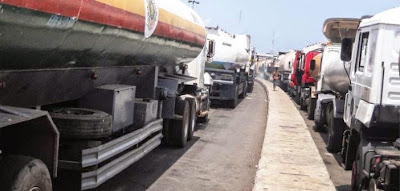Piqued by the gridlock in Apapa and other parts of Lagos, the Lagos State Government has issued a 48- hour ultimatum to tanker drivers who parked within 300 meters to fuel depots in the state to leave, pending the availability of fuel for loading.Hundreds of tankers have been parked on the Eko Bridge down to Apapa and on the Mile 2 Expressway queuing to load fuel that are not available, with commuters in the axis spending hours on a daily basis to get to their destinations.
The decision to ask tanker drivers who parked within 200 and 300 metres from the depots to leave Lagos was arrived at after a meeting between the state government and National Union of Petroleum and Natural Gas Workers (NUPENG), Petroleum Tankers Drivers (PTD), NARTO, among other unions in Ikeja yesterday.
Lagos State Commissioner for Transportation, Kayode Opeifa, said it was agreed at the meeting that tanker drivers queuing between 200 and 300 metres to the fuel depots should leave Lagos within 48 hours pending the availability of the commodity.
He said information available from the marketers revealed that there was no fuel in the depots to be lifted by the tankers.
The commissioner also said no tanker should be seen on Eko bridge down to Liverpool or from Coconut on Apapa Expressway, adding that before tomorrow, the tanker owners must make one lane available for motorists to be plying pending the expiration of the ultimatum for enforcement to begin.
Opeifa said the enforcement would be done by the various unions in the axis with the support of the state government, police and Federal Road Safety Corps (FRSC), saying any tanker that did not comply would be fined and would not be released until such fines had been paid.
He decried the untold hardship residents of Apapa and those working in the area were being made to pass through on a daily basis due to the blockage of the expressway by tanker drivers.
The commissioner appealed to NUPENG, PTD and NARTO to ensure that the agreement reached was not breached, saying by Friday afternoon, government would move into the axis to begin enforcement. He, however, said persuasion would be used rather than towing of the tankers.
He added that the marketers and major operators in the area had agreed to come out with a programming and ticketing method that would allow only tankers meant to lift fuel at a particular point in time within the axis.
